


Another depressingly mundane post. Click on the speech bubble to read all the upset comments or go back with the undo icon.
I was going to update something small here during my 3 weeks of vaykay I had last month. Ha! Never goes to plan. It was relaxing, have to say. I haven't taken that much time off in one go for over 3 years. I did my best to do absolutely nothing.
I picked up a few books during my time off, one of which was Eliot Higgins' new book We Are Bellingcat. The story starts off like the daydream of any 30-something guy working an office job: Eliot is working as a lowly sysadmin for a small company, feeling like he's never going to play a part in the "Grand Narrative" of history until through pure curiosity and skill is able to pretty much start up his own intelligence agency. It's a very interesting book and I'm glad the book focuses more on what he has investigated and how he went about searching for information. There are little pieces out autobiographical information when needed but mostly the book is actually about Bellingcat and the work they do. Worth picking up if you want something nice and light to read. It'll make you see the news in a new light, that's for sure.
The book left me with a weird craving to scratch at news and information and take a closer look at things and it was in the headspace when I stumbled upon a theory that has been making the rounds on different social media sites. On the 21st of June an article about a doctor from Alabama mentioned dying COVID patients were expressing regret about not getting vaccinated.This story was picked up by many other news outlets. I remember seeing the story pass me by on the front page of Reddit and thought little about it other than it seemed pretty sad. I think it was one of the few news article that week that I actually opened and read in its entirety.
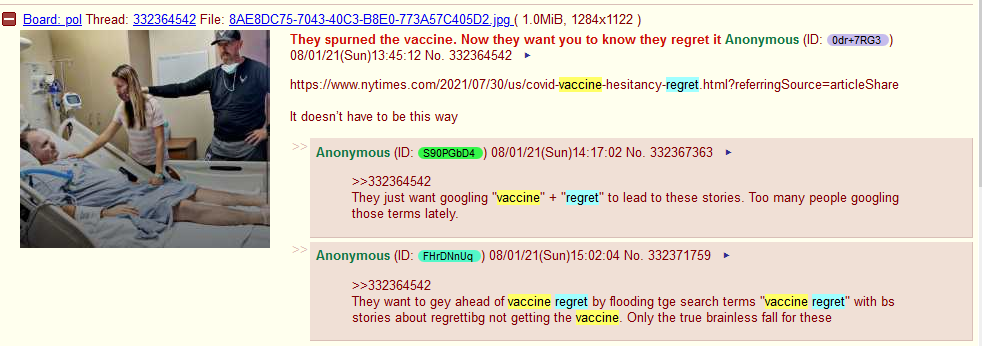
As was to be expected, there was a group of people claiming that the article was either an exaggeration, or worse, a Psy-Op designed to scare people into get the vaccine. Wanting to spread my wings a bit and give this OSINT thing a go, I thought I'd see what kind of information I could find about vaccine regret stories and if there was any evidence that the story was being pushed to one side or another.
There are a few questions that I thought I'd try to answer: 1) Is there any signs that vaccine regret stories are being fabricated? Either stories that people are regretting not getting vaccinated or regretting that they did? 2) Are vaccine regret stories leaning toward pro-vaxx or anti-vaxx?
I wanted to keep the questions fairly broad as this was my first dive into the world of open-source intelligence. I just wanted to find out what a person could find out by just looking around online. For this reason I want to warn you that what I have found shouldn't be taken as the final answer to the questions above. This is just what I've found and if you've come across anything new information, throw me some links in the comments.
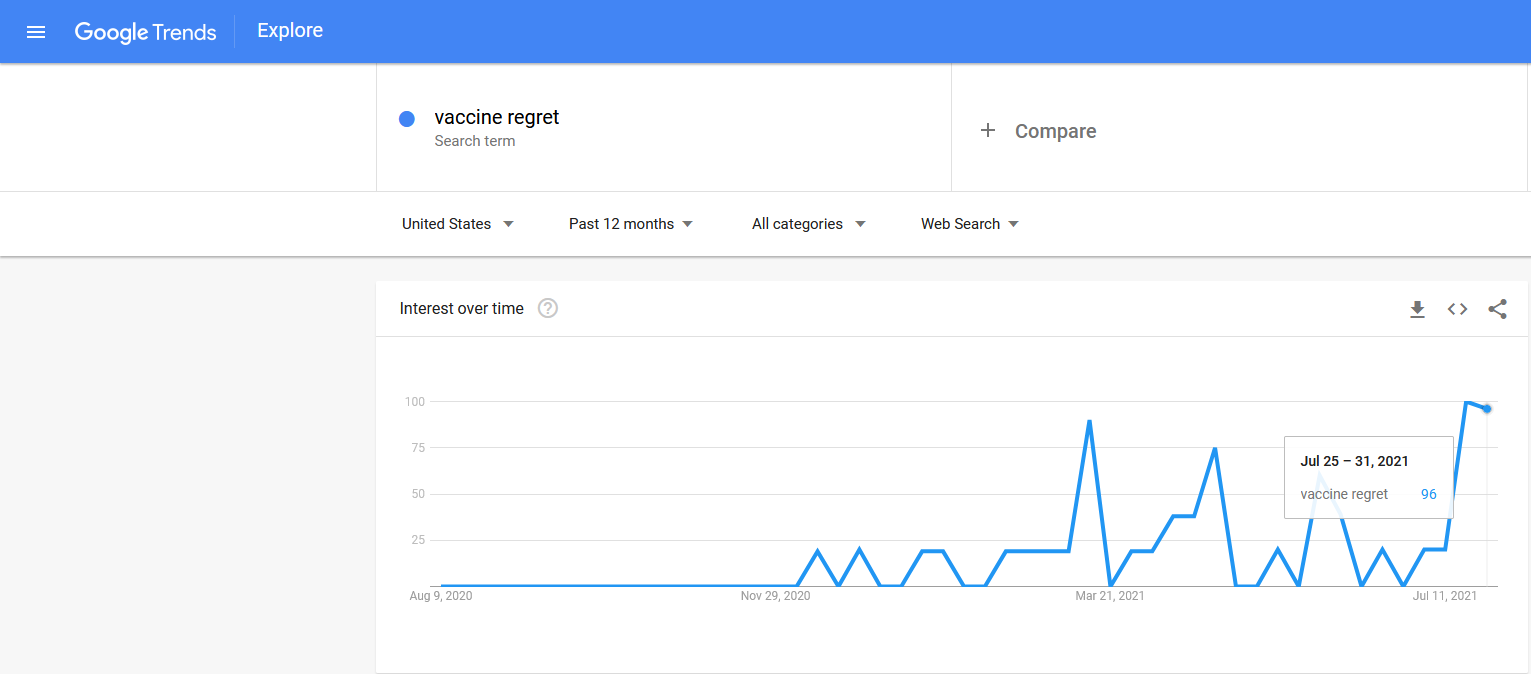
First of all I wanted to see what kinds of general data I could find and try to create a timeline for the whole "vaccine regret" phenomenon. Google Trends shows some spikes for "vaccine regret" searches started about the end of November, which is around the time COVID vaccines became available. The real spike in activity starts around 21 of June, which corresponds with the release of the AL.com article I mentioned above. It would then seem fair to say that it was this article that started the general mainstream interest in "vaccine regret".
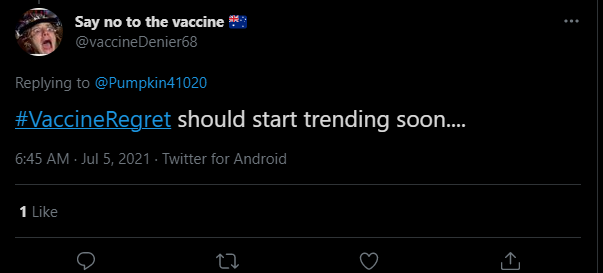
The first time the hashtag "#VaccineRegret" appears on Twitter is 5th of July by the user @vaccineDenier68. Taking a look through the user's account, it is pretty clear that they are very antivaxx and it looks like the hashtag started out as an antivaxx rallying cry. It didn't seem to popular for quite some time. The first time the hashtag was used in a provaxx sense was July 22 by the user @Domneva1 that places it around the time the first vaccine regret article came out.
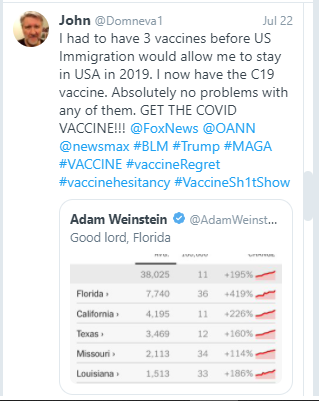
It was only after the AL.com article and a similar one written by the New York Time a week later when there really seems to be a battle of control over the #VaccineRegret hashtag. If you look at the messages using the hashtag you'll see both provaxx and antivaxx, with antivaxx seeming to come up more on top. So if these vaccine regret stories were meant to drown out the #VaccineRegret hashtag with provaxx stories, it seems to have failed. Outside of @vaccineDenier68 that seems to either be obsessed with antivaxxing or a bot, the hashtag would seem to be a pretty mild one and doesn't appear on "Trending" in my area.
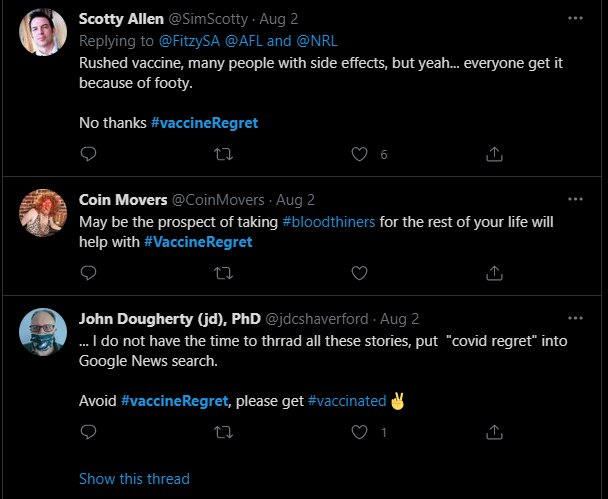
Outside of hashtags, by searching for simply "vaccine regret" starting for 20th of July to the present, you're going to see a similar mix of responses on Twitter. Many are referencing articles on vaccine regret, but in terms of sentiments, it's still pretty much tied between provaxx and antivaxx. Some are calling it a conspiracy by Mainstream Media, like the picture below, but I think a far more likely reason for every news outlet wanting to cover this story is because it's a gripping headline. Until I actually see evidence that Bill Gates is paying off every major new company in the world to promote vaccines for whatever reason, I'm going to side with my theory that journalists are lazy and like copying stories from each other.
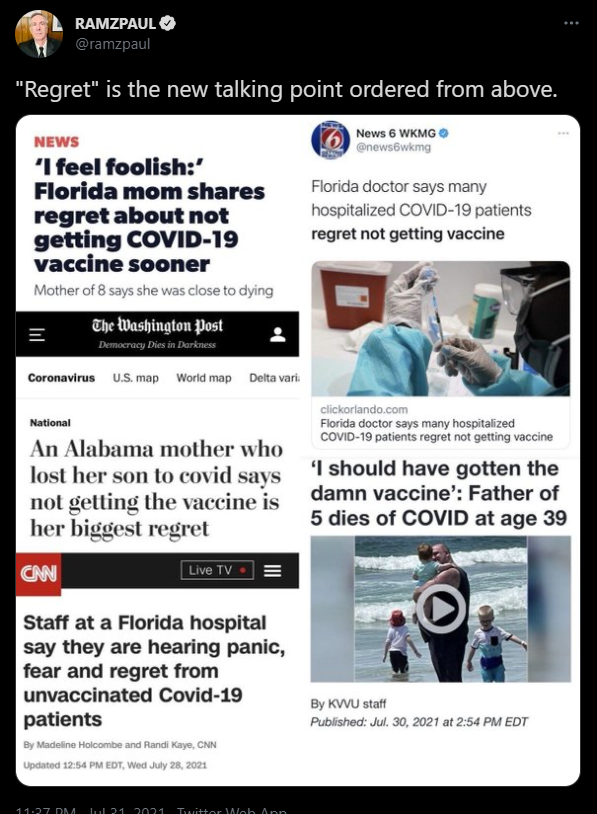
So, that I think answers question 2): "vaccine regret" isn't seeming to lean one way or another. It's just a nice little topic people can fight about online. To be honest, I was a bit disappointed! I wanted to see some kind of clear for/against bias but of course the reality was way more boring. Now for question 1): Is there something or someone pushing the narrative one way or another in a fishy way?
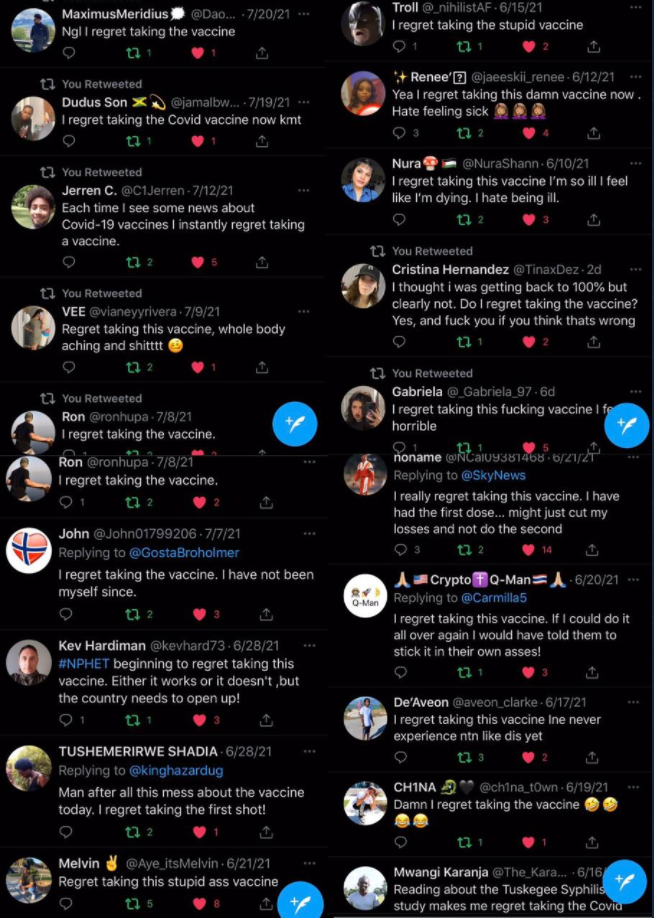
If you search for "vaccine regret", you'll find picture collages where people grab a bunch of users that have tweeted messages of regret about getting vaccinated. The accounts in these pictures often get called bots but I urge you to take a look at some of the accounts in the picture above. Some are shady for sure, but lot of these accounts seems like real people. None of them seemed to linger on the topic though: many just tweeted a regret tweet once or twice and then some hours later started talking about the NBA or whatever. As far as I can tell there isn't any obvious trickery here.
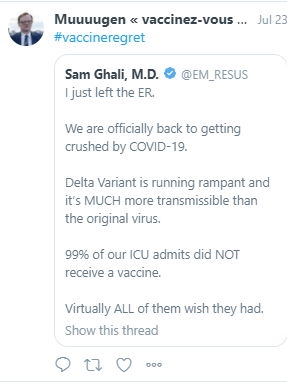
There are plenty of tweets on the provaxx side urging people to get vaccinated and mentioning possible regret as a justification. I couldn't find any clear pattern or typical provaxx response that would make me think that there was any coordinated campaign to push a provaxx viewpoint. The closest I saw to anything like identical wording was when people shared "vaccine regret" articles on Twitter, but that's down to users pressing that little Twitter Share button next to the article.
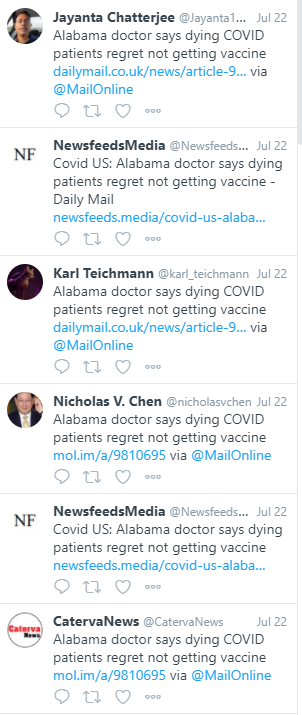
Despite using various terms like "ICU doctor vaccine regret" or "as a doctor regret", I was unable to find more than the occasional Twitter user claiming to be a health care worker and saying that a patient had personally expressed regret over not getting the vaccine. Mostly people have read these articles and shared them. Any similarities in stories comes from quoting these articles. Below are some search queries you can use to take look for yourself. If you can find a coordinated Twitter campaign with various users giving first-hand experiences of patients expressing regret, let me know!
regret not getting vaccination since_time:1626901200 until_time:1628024399 vaccine regret icu doctor since_time:1626814800 until_time:1627765199
So, to answer question 1), what I was able to find after an afternoon of hunting is NOTHING. Again, reality does not fail to disappoint. Instead of unraveling some kind of grand conspiracy, I was left feeling empty and exhausted. I found nothing but what was pretty much to be expected: people throwing shit at each other on the Internet. To be honest, that feels like the point with most of these conspiracy claims. You're not supposed to find anything if you look into them. They are by design vague with built-in deniability. Anyone who looks into them is supposed to feel like shit after looking into them and when sharing their findings, the conspiracy theorist can simply say that "your sources are MSM propaganda" or "the evidence was censored by Facebook" or, my favorite, "yeah, yeah, whatever". Something that took 2 minutes to say took over 6 hours to disprove thoroughly (this includes writing this blog post). I'm really not going to even bother with this stuff anymore, if someone has a point to make now, they can show me the evidence and send me the links directly.
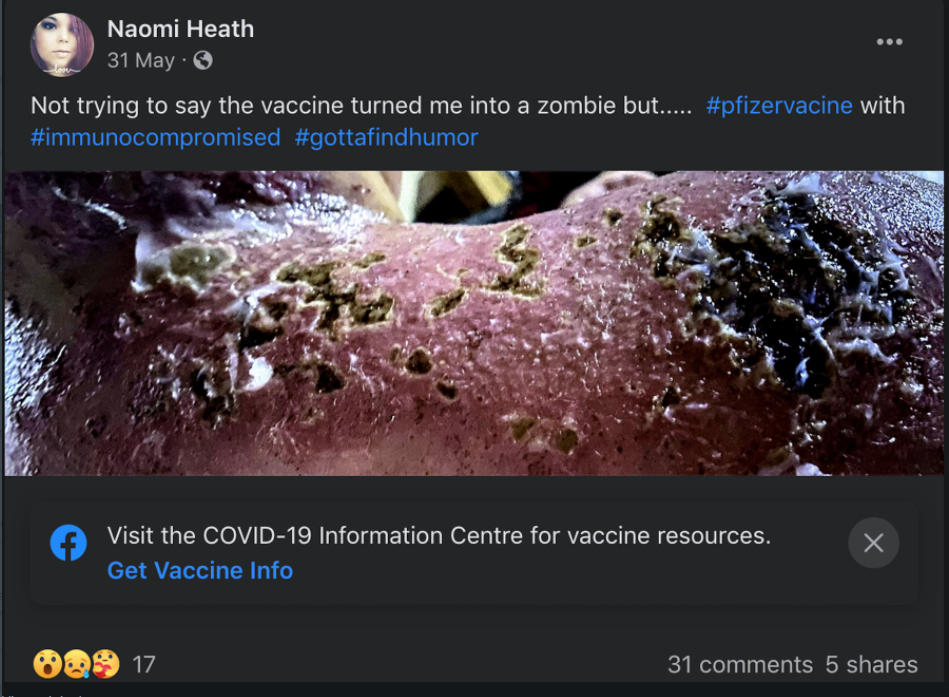
And believe me, I'm going to hold myself to that same standard. I think we are all a little lazy most of the time in sourcing the things we talk about. This whole ordeal has shown me that this is exactly how misinformation flourishes. Take a look at the piece of propaganda above: a rotting piece of flesh with the vague message: "Not trying to say the vaccine turned me into a zombie but...". Most people will not click on that link and only remember the image. Then some of those people are going to end up in a conversation over coffee, remember that image and say "hey those vaccines can have some bad effects, I came across an article where a person got a really bad skin reaction to it"...
Let's do something radical from now on. Let's start sourcing everything we say. I mean EVERYTHING.
Take a look at how the post from
Wednesday 4th of August 2021
upset the world!
No one cared enough about this post to say anything at all.
Let the world know how my words upset you.